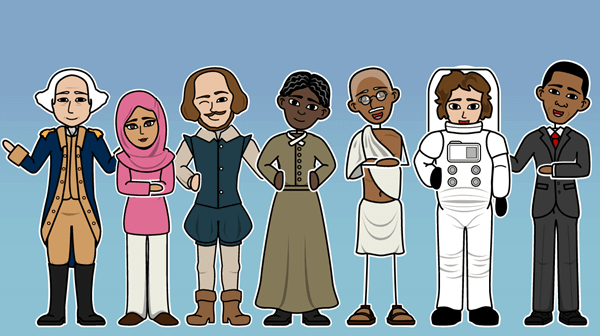Activități studențești pentru Biografii
Why Create Biographies?
When someone has a biography written about them, it is because they have done something in their life that others consider to be quite important--important enough to learn and write about! Usually the person has done something positive and admirable and is an inspiration to others.
In order to create a biography, students will learn about the person’s early life, childhood, education, family, and accomplishments. It is also important for the student to be able to express why they chose this person, and the impact this person has made on the world or the student’s life in particular. For example, students can ask: what can I learn from this person? What mistakes has this person made that I can relate to and grow from? How has this person inspired me?
When reading about and researching a person, students will encounter at least one theme, or recurring main idea, in a biography. The following is a list of potential themes:
- Sometimes life is tough and it takes strength to keep going.
- Believe in yourself and others will believe in you.
- No matter how many times you fail, never give up.
- The most difficult times in life can inspire others.
- Always have hope and stay positive.
- Know your worth: don’t let anyone drag you down.
Students should pay attention to what they think the theme is and be able to explain how they can learn from the person they are researching. Themes also make it much easier for students to present their chosen person's life as a narrative rather than a collection of facts.
Along with being able to identify the theme, there are certain elements of the biography genre that always need to be included in research if the information can be found. These elements are:
- Date and place of birth (and death, if applicable)
- Childhood
- Educational background
- Family life, either past, current, or both
- Adult life: job and current location, if applicable
- Major accomplishments
Other information like fun facts, quotes by or about the person, and photographs may also be included in the biography.
While researching an influential person, students will learn not only about the individual, but about many ways one person can change or contribute to the world. Learning about others helps us find the positive power within ourselves, and motivates us to be the best people that we can be. It is important for the student to fully be interested in learning about the person, so it is best if students choose on their own. Teachers may want to provide a list to help narrow down the choices by focusing on categories such as sports figures, entertainers, inventors, political figures, historical figures, change-makers, or someone the student knows personally. This way, they can make the biographies relevant to the unit they're teaching or the time of year!
Essential Questions for Biographies
- Where and when was this person born?
- What was this person’s childhood like?
- What kind of education did this person have?
- What is/was this person’s family life like?
- What are/were this person’s accomplishments?
- What positive contributions has this person made to the world?
- Why did I choose this person?
Cum să Predați Biografii Într-o Școală Elementară
Explorați Evenimentele Vieții din Poveste
Începeți prin a vorbi cu studenții despre evenimentele cheie ale vieții din biografie. Luați în considerare data nașterii, viața de familie, educația, locurile de muncă și evenimentele personale. Ghidați elevii prin evenimentele cheie ale vieții în ordine cronologică.
Vorbește Despre Teme
După ce înțeleg evenimentul din viața unei persoane, îi poți conduce să discute teme sau ceea ce învață despre viață din povestea biografică. Temele comune includ a face diferența, a depăși obstacolele și a avea întotdeauna speranță.
Conectați-vă la Viața de Student
Rugați elevii să folosească o diagramă Venn pentru a se conecta cu persoana din biografie. Ei pot împărtăși lucruri pe care le au în comun în mijlocul cercurilor și lucruri care sunt diferite la fiecare dintre ei în exterior.
Desenează-l
Lăsați elevii să deseneze o biografie corporală pentru a înțelege persoana mai pe deplin. Pune-i să completeze părți ale corpului, cum ar fi să pună ceea ce iubește personajul în zona inimii și să deseneze în cap ceea ce gândește persoana respectivă.
Întrebări frecvente despre biografii
Cum îi ajută biografiile pe elevi să înțeleagă modul în care oamenii se relaționează cu lumea din jurul lor?
Când citim o poveste despre cum o persoană și-a trăit viața, putem înțelege mai bine puterea din noi înșine și putem vedea cum contează viața noastră. Fiecare persoană influențează lumea din jurul său.
Care sunt câteva teme comune care parcurg biografii?
Multe biografii predau lecții cum ar fi cum să depășești obstacolele, cum să crezi în tine și să profiti la maximum de ceea ce ai.
Ce elemente universale se găsesc în aproape toate biografiile?
Majoritatea biografiilor explică datele de naștere și de deces ale unei persoane (dacă a murit), cum a fost copilăria, educația, realizările profesionale și realizările personale sau familiale.
De ce ar trebui să citim biografii?
Când citim despre luptele și triumfurile altor oameni, vedem ce avem în comun și suntem capabili să vedem importanța propriei noastre vieți.
© 2026 - Clever Prototypes, LLC - Toate drepturile rezervate.
StoryboardThat este o marcă comercială a Clever Prototypes , LLC și înregistrată la Oficiul de brevete și mărci comerciale din SUA








